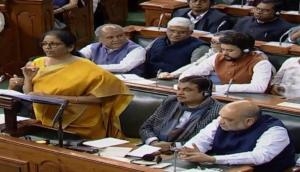
The Narendra Modi-led Union government might have tried to impose the much-hyped 'Gujarat Model' in various spheres of governance, but when it comes to the proposal to bring in a modern law on contract farming, it is most likely going to look towards Punjab.
Finance Minister Arun Jaitley, in his budget speech, made a proposal to bring about a modern law on contract farming, that would be circulated among various states. Sources say the Centre is going to frame the said law on the basis of the Punjab Contract Farming Act, 2013, which, somehow, is yet to become operational.
But it needs to go over and above the existing Act to protect the interests of the farmer. Punjab had gone in for the enactment of the Act instead of taking the route of amending the Agricultural Produce Market Committee (APMC) Model Act, like has been done by states like neighbouring Haryana and Gujarat. Contract farming, in case of certain crops, has reportedly been on in parts of Punjab since the 1990s.
Salient features of Punjab's Act
The Punjab Act calls for setting up of a 'Contract Farming Commission', and underlines that the state government will declare control over the purchase, sale, storage, and processing of agricultural produce to be covered under contract farming.
The buyer company has to register with the local registering authority by paying a fee.
The duration of a contract can be one crop season to three years, and 108 crops are notified under the Act.
The buyer will have to submit reports of the contract transactions to the registering authority, as well as the commission.
The Act states that the contract farmed produce can be sold in the APMC market, or at the farm itself, or as specified in the agreement.
The buyer has to make arrangements for packing and weighing of the produce in advance of delivery, and give a receipt to the farmer as proof of the delivery of the produce. There can be no rejection of produce after delivery to the buyer.
The Act also calls for payments by cheque or demand draft, or the Electronic Clearing System (ECS) on the spot at the time of delivery, failing which, interest will be paid for up to 30 days, otherwise the commission can recover it as land revenue with interest.
In case of a deliberate delay by the buyer in payment, the bought produce can be seized by the commission.
Crop loss or damage is to be recovered from the buyer if it supplied inputs and extension as per the commission's decision.
The district collector is responsible for contract farming dispute resolution, and has to give a decision within 30 days. No civil court can entertain such cases. Decisions of the commission are to be followed like a court decree.
Why Punjab addressed just one aspect in its Act
IIM Ahmedabad faculty member Sukhpal Singh has been pointing out that there are two major aspects of the APMC Model Act, besides the legalisation of contract farming. These are: direct purchases from farmers, and the setting up of private wholesale markets to give a choice to farmers to sell wherever and whoever they would like to.
The Punjab Act deals only with contract farming and not the other two reforms.
He points out that the reason why Punjab went in for a separate Act was the fact that the interests of commission agents (Arhtiyas) and farmers are poles apart. Farmers want direct payments, but the Arhtiya lobby is opposed to it, as it hits the business of interlocking of credit, input and output markets run by them through a paper slip system. The government, perhaps, does not want to upset the Arhtiya lobby.
Experts' view
Coming back to Jaitley's proposal, experts say it is too early to say what the government is aiming at through the proposed new law.
Professor Gian Singh of Punjabi University in Patiala says the Minimum Support Price (MSP) model is also a form of contract between the government and the farmer. Why doesn't the government simply follow this model by covering all crops under this?
He said the form of contract farming that has been going on in Punjab has not yielded the desired results, and most of the time, the farmers have been cheated. If the produce fetches a good price in the market, the company takes the route of just paying the price agreed upon, and if the market prices are not good, the companies pay a lesser price while raising questions on the quality.
He says that the model has worked only for big farmers.
"It appears to be an illusion that the government is creating, while trying to divert the attention of the farmers. It is an attempt to do away with the MSP model," he told Catch.
Sukhpal Singh, on the other hand, points out that there is a need for a comprehensive contract farming law that takes care of the interests of the farmers. He says: "The MSP model cannot cover everything. It cannot work for every crop. Bringing everything under MSP is an extreme view. There are multiple channels that need to be addressed."
Dr RS Ghuman, an expert at the Centre for Research in Rural and Industrial Development (CRRID), points out that the advantage in contractual farming is that companies provide technology and seeds besides paying a stipulated price. He is also an advocate of the MSP model, but at the same time, he points out that in case there is another model to promote contract farming, it should have three stakeholders - the farmer, the company and the government.
He says: "The need of the hour is agro-processing through farm co-operatives, which not only adds value to the produce, but also provides employment and proper marketing. The model should be customised and region-specific, to address the needs of diversification and agro-processing."
Edited by Shreyas Sharma
First published: 1 February 2017, 7:51 IST






![BJP's Kapil Mishra recreates Shankar Mahadevan’s ‘Breathless’ song to highlight Delhi pollution [WATCH] BJP's Kapil Mishra recreates Shankar Mahadevan’s ‘Breathless’ song to highlight Delhi pollution [WATCH]](https://images.catchnews.com/upload/2022/11/03/kapil-mishra_240884_300x172.png)

![Anupam Kher shares pictures of his toned body on 67th birthday [MUST SEE] Anupam Kher shares pictures of his toned body on 67th birthday [MUST SEE]](https://images.catchnews.com/upload/2022/03/07/Anupam_kher_231145_300x172.jpg)






